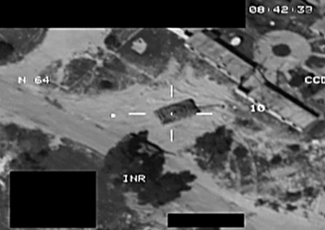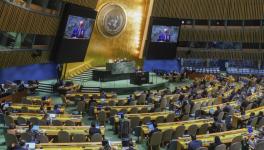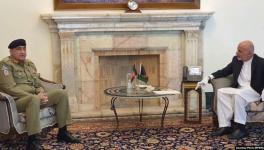Snatch and Render from Libya
In 2004, the British government brokered the transfer of militants of the Libyan Islamic Fighting Group (LIFG) from their “undisclosed locations” in the War on Terror to the Qaddafi regime. “This was the least we could do for you and for Libya to demonstrate the remarkable relationship we have built over the years,” wrote Sir Mark Allen, head of Britain’s MI6 to Qaddafi’s aide Moussa Koussa on 18 March 2004. The specific matter here was the “safe arrival of Abu Abdallah Sadiq,” the nom de plume of Abdul Hakim Belhadj, former emir of LIFG. When Belhadj and his wife arrived in Libya through a MI6-CIA operation, Moussa Koussa chillingly greeted Belhadj, “I’ve been waiting for you.” Belhadj was subsequently tortured and brutalized. All this is documented in the Human Rights Watch report from 6 September 2012, Delivered Into Enemy Hands: US-Led Abuse and Rendition of Opponents to Gaddafi’s Libya.
On Saturday, 5 October 2013, some US agents (either Libyans or Americans) went into the upscale neighbourhood of Tripoli called Noufleen and snatched Nazih Abdul-Hamed al Ruqai (whose alias is Anas al Libi). He was put on a boat and taken to a US war ship in the Mediterranean. The US indicated that al Ruqai would be taken to New York where he will face a 2000 indictment for the 1998 US embassy bombings in east Africa. Al Ruqai is on that indictment with dozens of others, including, at the top of the list the now dead Osama bin Laden. The US and Libya do not have an extradition treaty. Nevertheless, the normal procedure is for a government to ask another government to turn over a suspect or a criminal who is shielded by the latter’s territory. It appears that no such request for al Ruqai had been made by the US, and nor did the US inform Libya about the operation. No wonder then that the Libyan Prime Minister Ali Zeidan called the snatch raid on al Ruqai a case of “kidnapping.”

Still image taken from footage from an RAF Tornado GR4, showing the aircraft using Brimstone Missiles to destroy a Main Battle Tank in Libya during Operation Ellamy in 2011. Image from Wikimedia Commons.
Almost ten years ago, when Qaddafi ruled Libya the US and UK turned over several high-value LIFG targets who had been designated “unlawful enemy combatants” and so faced “extraordinary rendition” to US “black sites” before going to Abu Salim prison in Tripoli. Now, in a Libya ruled by a government who owes its existence to the US-NATO bombardment of 2011, the US enters Libya unlawfully to snatch a Libyan citizen so that he, in US eyes an “unlawful enemy combatant,” can be taken onto a US ship and then transported to New York. Despite the confusion, the two stories are linked: they show a pattern of disregard for international law by the US and the UK and the sovereignty of other states, including its allies.
Transitional Justice in Libya
Since its formation in March 2012, the UN Support Mission in Libya (UNSMIL) has tried to establish the rule of law as the normal course for the new government. This has been a daunting task. Not only had the forty-two year old Qaddafi regime left a very poor record of human rights and legal norms, the war of 2011 had itself been conducted with little care for the human rights rhetoric that motivated it. Retribution by the rebel militias against the pro-Qaddafi forces and imputed populations loyal to Qaddafi, such as the residents of the town of Tawerga, put a stain on the new Libya. The UN urged the National Transitional Council to enact a decree that would lay the “Foundation for National Reconciliation and Transitional Justice.” The last phrase, transitional justice, comes from a UN Secretary General report of 2004 which defines the phrase as “the full range of processes and mechanisms associated with a society’s attempts to come to terms with a legacy of large-scale past abuses, in order to ensure accountability, serve justice and achieve reconciliation.” After immense effort by the UNSMIL and the new Libyan government, the General National Congress passed a transitional justice law on 22 September 2013. The law included provisions on fact-finding, reparations for victims and accountability for past crimes. It is a comprehensive approach that would have gone a long way to establish the sovereignty and integrity of the new Libyan state.
As if to underscore the importance of this law, the UN released a report on 1 October on Torture and Deaths in Detention in Libya, which showed the extent of custodial deaths and torture of political prisoners. The Libyan government passed a law this April banning the use of torture. It is part of the process of bringing the armed brigades under government norms and control. Tarek Mitri, the UNSMIL head, said that the new law against torture and for transitional justice would “contribute to establishing the rule of law in the country.” US Ambassador Deborah Jones seconded Mitri’s position at the Transitional Justice Law Conference in the General National Congress hall to explain the new law. Ambassador Jones said that the US government was committed to the establishment of a sovereign and effective Libyan state.
It must have come as a shock to Ambassador Jones to see her government send in a Navy Seals squad to snatch al Ruqai from Tripoli’s streets without any care for the integrity of the Libyan state and of the emergent Libyan legal regime. In May, President Barack Obama had declared that the War on Terror is now over, with al-Qaeda on “a path to defeat.” Focus on al-Qaeda in the Arabian Peninsula, the “most active” branch, would continue, but the architecture of the War on Terror, including Guantanamo, would be dismantled. The raid on Libya, however, takes us back to the high point of the War on Terror, to the snatch and render raid in Milan in 2009 to capture Abu Omar and take him to Egypt’s prisons. It also reflects what has been happening more quietly off the Somali coastline (site of the failed simultaneous raid). In April 2011, the US captured Ahmed Warsame from a fishing vessel, held and interrogated this al-Shabaab courier on the USS Boxer for two months before turning him over to a New York courtroom. This is likely the fate of al Ruqai. US Secretary of State John Kerry said that the message here is that terrorists “can run but they can’t hide.” But the message to Libya is something else: rule of law is fine for the Libyan government but it means little for the US government.
Disclaimer: The views expressed here are the author's personal views, and do not necessarily represent the views of Newsclick
Get the latest reports & analysis with people's perspective on Protests, movements & deep analytical videos, discussions of the current affairs in your Telegram app. Subscribe to NewsClick's Telegram channel & get Real-Time updates on stories, as they get published on our website.
























